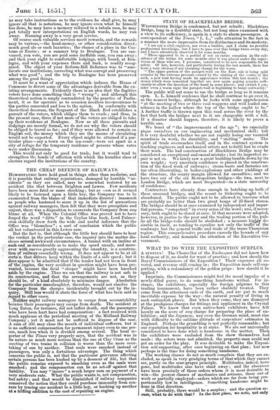THE CHEAP DEFENCE OF RAILWAYS.
Homo:Bor./iliac laws hold good in things other than medicine, and it is possible that railway reputations, damaged by horrible " ac- cidents" as they are called, may be somewhat restored by an accident like that between Brighton and Lewes. Few accidents have been more fatal or more shocking ; but as soon as it seemed likely to be fastened upon a little boy, the Company was to be exonerated from the blame of that immediate disaster : inasmuch as people who hastened to score it up in the list of accusations against railway managers, then felt that they were precipitate and unjust, there was a disposition to exonerate the Company from any blame at all. When the Colonial Office was proved not to have forged the word " ditto" in the Ceylon blue book, Lord Palmer- ston skilfully drew forth the wide and useful inference that the Office was " blameless" ; a. sort of conclusion which the public all but volunteered in this Lewes case.
But the fact is, that although the little boy should have to bear the verdict in the particular case, the inquiry into the matter dis- closes several awkward circumstances. A tunnel with an incline at each end so considerable as to make the speed unsafe, and more- over with curves greatly aggravating the unsafety, is a construc- tion of railway, essentially wrong. It does not appear to be at all certa'n that drivers keep within the limits of a safe speed ; but it does appear to be admitted that if the tender had not been in front of the engine, the very accident in question might have been pre- vented, because the fatal " sleeper" might have been knocked aside by the engine. Thus we see that the railway is not safe in its construction, and that the arrangements are not, as they should be, of a kind absolutely to minimize danger. Absolution for the particular manslaughter, therefore, would not absolve the Company from the charges incidentally brought out by the in- quiry. Still less would it abate the force of what has been said in regard to other cases. Neither ought railway managers to escape from accountability because their passengers may escape from death. The accident at Long Eaton, for instance, did not inflict death, and the passengers who have been hurt have had compensation : a fact received with much applause at the periodical meeting of the Midland Railway Company ; yet it must not be suffered to dispose of the case. A sum of 331. may close the mouth of individual sufferers, but it is no sufficient compensation for permanent injury even to one per- son, much less when it is divided among several. The local re- porter of the Times very properly says, that the accident was in its nature as much more serious than the one at Clay Cross as the meeting of two trains in collision is worse than the mere over- taking of one by another. That coals were smashed instead of passengers, was only a fortuitous advantage. The thing which concerns the public is, not that the particular grievance affecting certain persons has been hushed up by a douceur of 331., but that the public remains exposed to smashing even as the coals were smashed ; and the compensation can be no set-off against that liability. You may " insure " a much larger sum on payment of a very moderate rate. What the public wants is, not compensation, but safety ; and that would be diminished if railway, companies conceived the notion that they could purchase immunity from cen- sure by tracing one accident to a little boy, or hushing up another at a trilling addition to the cost of repairing an engine.


























 Previous page
Previous page